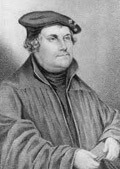the First Sunday of Lent
free while helping to build churches and support pastors in Uganda.
Click here to learn more!
Bible Commentaries
Luther's Commentary on Galatians Luther on Galatians
New Testament
Author's Biography
Martin Luther, born on November 10, 1483, in Eisleben, Germany, was a seminal figure in the Protestant Reformation. His questioning of certain practices and doctrines of the Roman Catholic Church sparked a movement that dramatically changed the course of Christianity in Europe.
Luther's early life was marked by rigorous education. He attended the University of Erfurt, where he earned a Master's degree. Initially setting out to study law, Luther experienced a spiritual awakening during a thunderstorm in 1505, which led him to join the Augustinian monastery in Erfurt. There, he delved deeply into the study of the Bible, which laid the foundation for his later theological insights.
In 1512, Luther earned a Doctorate in Theology and became a professor at the University of Wittenberg. His scholarly pursuits and deep commitment to understanding the Bible fueled his growing concerns over certain church practices, notably the sale of indulgences, which he viewed as a corruption of the Christian faith.
On October 31, 1517, Luther famously nailed his Ninety-Five Theses to the door of the Wittenberg Castle Church, criticizing the sale of indulgences and calling for reform within the church. This act is often considered the starting point of the Protestant Reformation. His theses spread rapidly throughout Europe, thanks to the printing press, igniting debates and discussions on church practices and governance.
Luther's refusal to recant his writings at the Diet of Worms in 1521 resulted in his excommunication by Pope Leo X and condemnation as an outlaw by the Holy Roman Emperor Charles V. Despite these challenges, Luther continued his theological work, translating the Bible into German, which made the scriptures more accessible to the general populace, and writing numerous works that laid the groundwork for the Lutheran denomination.
Martin Luther's contributions were not limited to theology; he also impacted church liturgy, music, and education. His marriage to Katharina von Bora and advocacy for clerical marriage broke new ground in how clergy and laypeople viewed life in the Christian community.
Luther passed away on February 18, 1546, but his legacy endures in the numerous Christian denominations that trace their origins to the Reformation he helped ignite. His call for religious reform, emphasis on scripture as the sole authority, and belief in salvation through faith alone remain foundational to Protestant Christianity.
